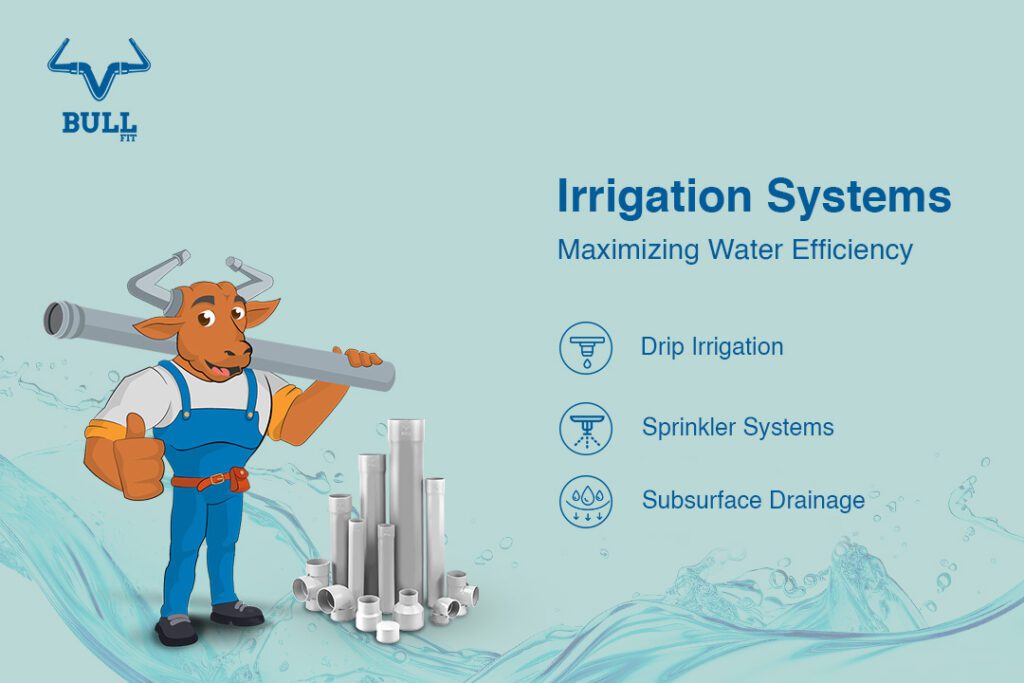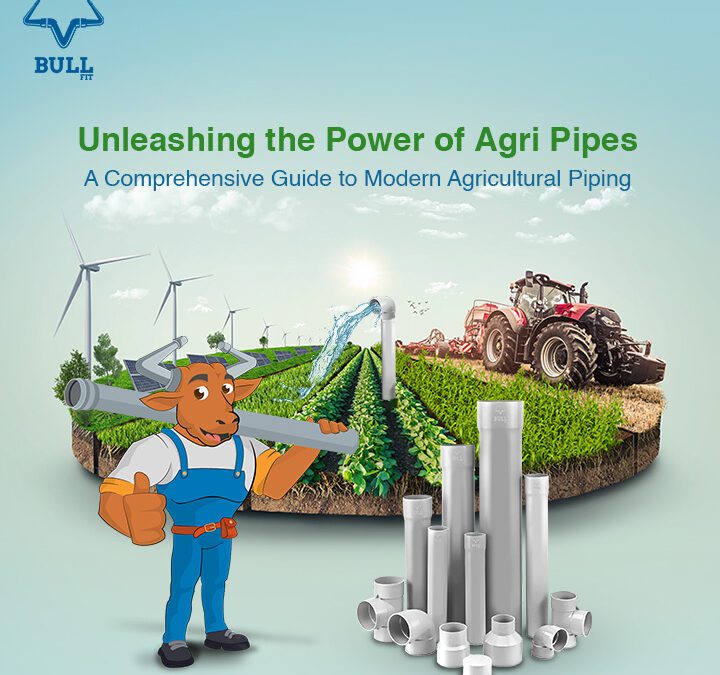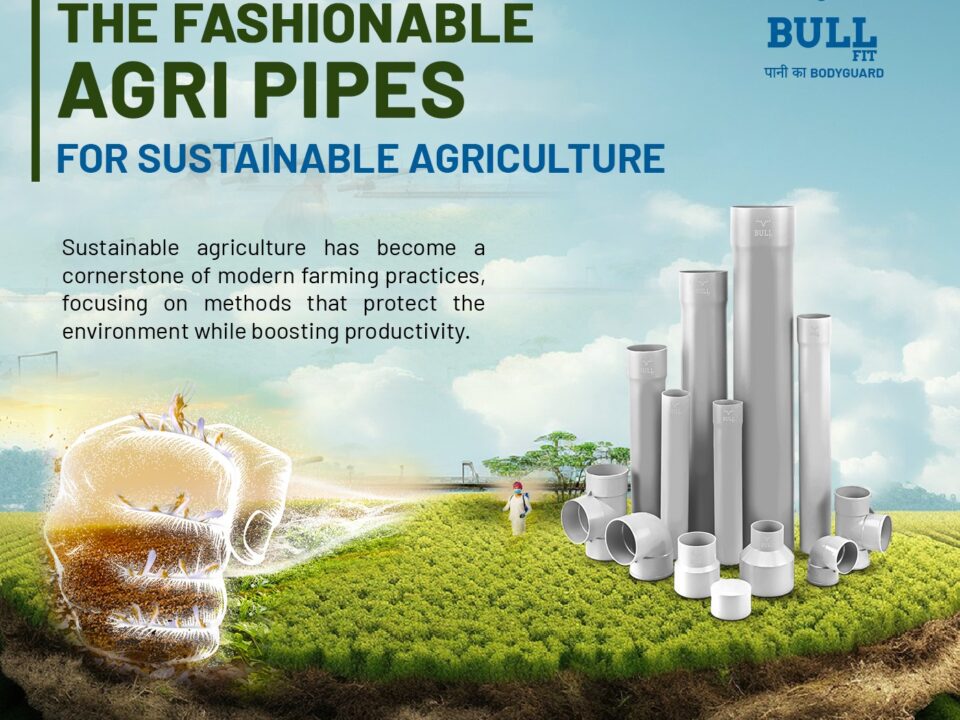
More Crop Per Drop: How Bull Fit Agri Pipes Maximize Water Efficiency
April 11, 2024
3 Maintenance Tips for Water Storage Tanks to Ensure Longevity
April 22, 2024Unleashing the Power of Agri Pipes: A Comprehensive Guide to Modern Agricultural Piping
In today’s rapidly evolving agricultural landscape, efficient water management and distribution have become paramount for successful farming operations. Agri pipes, also known as agriculture pipes, play a crucial role in ensuring that precious water resources reach crops effectively, maximizing yields, and minimizing waste. This comprehensive guide delves into the world of modern agricultural piping, empowering farmers to harness the full potential of these essential systems.
Choosing the Right Material of Agri Pipes:
The first step in establishing an effective agricultural piping system is selecting the appropriate material. Several options are available, each with unique characteristics:
- PVC (Polyvinyl Chloride) Pipes: Known for their durability, cost-effectiveness, and resistance to corrosion, PVC pipes are widely used in irrigation systems. They are lightweight, easy to install, and can withstand moderate pressures.
- HDPE (High-Density Polyethylene) Pipes: HDPE pipes are renowned for their flexibility, making them ideal for curved or uneven terrain. They are highly resistant to chemicals, abrasion, and UV radiation, ensuring long-lasting performance in various agricultural settings.
- Concrete Pipes: Widely used for subsurface drainage, concrete pipes are robust and can withstand immense pressure from soil and water. Their durability makes them a reliable choice for long-term drainage solutions.
- HDPE Pipes: While HDPE (High-Density Polyethylene) pipes are lightweight, durable, and resistant to corrosion, they can be susceptible to damage from ultraviolet radiation and extreme temperatures. Additionally, these pipes may experience expansion and contraction due to temperature fluctuations, which can lead to leaks or breaks over time. They also have a limited lifespan compared to some other materials, such as concrete or metal pipes.
- Concrete Pipes: Concrete pipes are known for their strength and durability, but they can be heavy and difficult to transport and install, especially in areas with challenging terrain. They are also susceptible to cracking and corrosion over time, particularly in areas with high soil acidity or alkalinity. Furthermore, concrete pipes can be more expensive than some other pipe materials, making them a less cost-effective option for some agricultural applications.
- GI Pipes: Galvanized Iron (GI) pipes are durable and resistant to corrosion, but they can be heavy and difficult to install, especially in large-scale agricultural applications. These pipes can also be susceptible to rust and scaling over time, which can reduce their efficiency and lifespan. Furthermore, GI pipes may require specialized tools and expertise for installation and maintenance, which can increase overall costs.
Selecting the right piping material depends on factors such as water pressure, soil conditions, crop requirements, and budget constraints. Consulting with agricultural experts or experienced suppliers can help ensure the optimal choice for your specific needs.
Irrigation Systems: Maximizing Water Efficiency
One of the primary applications of Agri pipes is in irrigation systems. Efficient water delivery is crucial for crop health, yield optimization, and water conservation. Several irrigation methods leverage the power of piping:
Drip Irrigation: Drip irrigation systems distribute water directly to the root zones of plants through a network of small-diameter pipes and emitters. This targeted approach minimizes water waste and promotes optimal plant growth.
Sprinkler Systems: Sprinkler irrigation systems utilize a network of pipes and sprinkler heads to simulate rainfall, delivering water evenly across large areas. These systems are well-suited for crops that require uniform moisture distribution.
Subsurface Drainage: In areas with high water tables or poor soil drainage, subsurface drainage pipes play a vital role in removing excess water from fields. This prevents waterlogging, reduces soil erosion, and creates an ideal environment for healthy root development.
Proper installation, maintenance, and monitoring of these irrigation systems are essential for maximizing their efficiency and ensuring long-term performance.

Greenhouse and Livestock Facility Piping
Beyond conventional crop cultivation, Agri pipes find numerous applications in greenhouses and livestock facilities. In greenhouses, Agri pipes are used for irrigation, climate control (heating and cooling), and fertigation systems, ensuring optimal growing conditions for plants. In livestock facilities, pipes are employed for water distribution, manure management, and ventilation systems, contributing to animal health and productivity.
Smart Irrigation Systems: The integration of sensors, automation, and data analytics allows for precise water delivery based on real-time soil moisture, weather conditions, and crop requirements, reducing water waste and enhancing yields.
Leak Detection and Water Quality Monitoring: Sophisticated sensors and monitoring systems can detect leaks, monitor water quality, and alert farmers to potential issues, enabling proactive maintenance and minimizing losses.
By embracing these emerging trends and technologies, farmers can future-proof their agricultural piping systems, ensuring long-term efficiency, sustainability, and profitability.
Conclusion
Bull Fit Agri pipes are the unsung heroes of modern agriculture, quietly enabling farmers to harness the power of water and deliver it precisely where it is needed most. By understanding the various piping materials, irrigation methods, and emerging technologies, farmers can optimize their operations and unlock the full potential of their land. Investing in robust, efficient, and sustainable agricultural piping systems is a crucial step toward achieving sustainable food production, water conservation, and a greener future for our planet.




